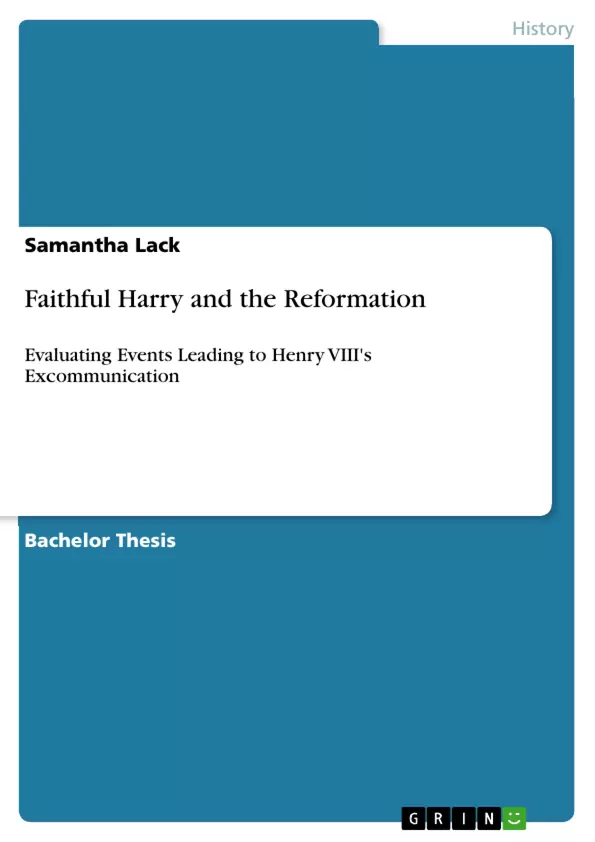Henry VIII was a larger than life figure, and continues to be treated as such today, but what led to his break with Rome and his Royal Supremacy status in England? Was it Anne Boleyn, the search for a male heir, or the need for financial security in England that ultimately caused the break? Countless historians have taken on the task of answering this question and many theories have circulated. My poster will follow Henry through the Reformation and, in due course, conclude with the onset of the Reformation. I’m especially interested in Henry’s Seven Sacraments. As a result of my research, I believe that the real inspiration behind Henry’s desire to divorce Catherine of Aragon was his yearning for a male heir. Anne Boleyn could not have been the prime reason or the instigator during the pre-Reformation time. I find conclusive evidence that shows Henry swaying towards a divorce before Anne was present at court and caught the eye of the king. Financial security for England is another theory that has been presented, but this security came with the Reformation; it was not the cause. Henry was more concerned with the security of the throne than fiscal worries when he first criticized Rome. There are several benefits in understanding the English Reformation and its foundations. Such understanding can help us discern the psychology of Henry VIII as a man, partially help the tarnished reputation of Anne Boleyn, and make clearer the history of England post-Reformation.
Keywords: Henry VIII, Reformation, Anglican
Inhaltsverzeichnis (Table of Contents)
- Introduction
- Henry VIII's Early Life
- The Marriage of Henry VIII and Catherine of Aragon
- The Reign of Henry VIII
- The Birth of Mary
- The Reformation and the Rise of Martin Luther
- Henry VIII's Defense of the Catholic Church
- Luther's Response to Henry VIII's Defense
- The Threat of Luther's Teachings
- The Translation of the New Testament
- Conclusion
Zielsetzung und Themenschwerpunkte (Objectives and Key Themes)
This work aims to provide a comprehensive evaluation of the events leading to Henry VIII's excommunication, examining the King's evolving religious beliefs and the impact of the Reformation on his reign. The text explores how Henry's life choices, particularly his marriage to Catherine of Aragon and his defense of the Catholic Church against Martin Luther, shaped his eventual break with Rome.
- Henry VIII's early life and upbringing
- The marriage of Henry VIII and Catherine of Aragon and its significance
- The emergence of the Reformation and Martin Luther's teachings
- Henry VIII's defense of the Catholic Church and his role in the religious upheaval of the time
- The evolving relationship between Henry VIII and Martin Luther, and the impact of their theological disagreements on England
Zusammenfassung der Kapitel (Chapter Summaries)
The chapters of this text provide a detailed chronological account of Henry VIII's life and the events leading to his excommunication. Early chapters focus on his youth and education, highlighting his early devotion to the Catholic Church. The text then examines his marriage to Catherine of Aragon, exploring the political and religious factors that shaped this union. Subsequent chapters discuss the rise of the Reformation, the impact of Martin Luther's teachings on Europe, and Henry VIII's strong defense of the Catholic Church. The text then delves into the growing tension between Henry VIII and Martin Luther, exploring their theological debates and the exchange of writings. Finally, the text examines the translation of the New Testament into English and its implications for religious reform.
Schlüsselwörter (Keywords)
The text focuses on key concepts related to the Reformation, including Henry VIII's evolving religious beliefs, the marriage of Henry VIII and Catherine of Aragon, the impact of Martin Luther's teachings, the defense of the Catholic Church, and the translation of the New Testament into English. It explores themes of power, authority, and the relationship between church and state during a period of significant religious upheaval in Europe.
Frequently Asked Questions
What was the primary reason for Henry VIII's break with Rome?
Research suggests that Henry VIII's yearning for a male heir was the primary inspiration behind his desire to divorce Catherine of Aragon and break with the Catholic Church.
Was Anne Boleyn the instigator of the Reformation?
Evidence indicates that Henry was already considering a divorce before Anne Boleyn became a prominent figure at court, suggesting she was not the prime cause.
How did Henry VIII initially react to Martin Luther's teachings?
Henry VIII initially strongly defended the Catholic Church against Luther, even writing a defense of the Seven Sacraments.
Was financial security the cause of the English Reformation?
While financial security for England followed the Reformation, it was a result rather than the original cause of Henry's break with Rome.
What is the significance of the translation of the New Testament during this period?
The translation of the New Testament into English was a key element of religious reform, allowing common people to access scripture directly.
- Arbeit zitieren
- Samantha Lack (Autor:in), 2011, Faithful Harry and the Reformation, München, GRIN Verlag, https://www.grin.com/document/194093



